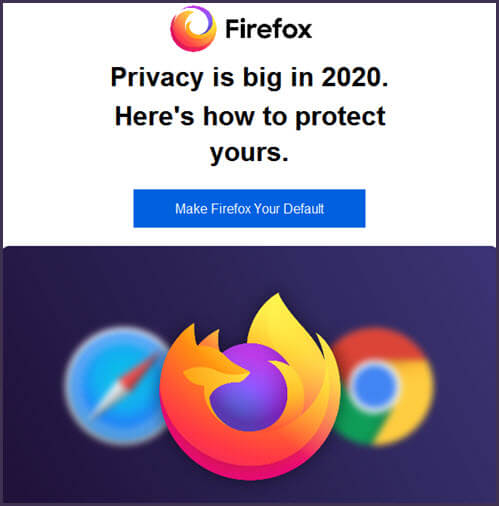There have always been two topics where any sort of discussion is sure to instigate a lively debate– Browsers and Antivirus. These days, I think it’s safe to say that we can add ”Privacy” to that list. Is 100% online privacy a realistic goal? Emphatically, no. The modern online world, by its very nature, is a community-minded, sharing environment. We can take steps to limit our exposure but, in the end, every online user is exposed to some extent or another.
Browser Privacy
These days, with more and more online presences collecting data, many users have at least some degree of concern over their online privacy. However, there are a number of anomalies which, I find, often contradict these concerns. Take the Google Chrome browser for example. Google has been at the forefront of data collection for a long time yet produces by far the most popular (used) browser on the planet. Yes, there are a number of extensions that help prevent tracking and block ads, but still, if someone is using Chrome as their default browser and complains about the lack of privacy online, to me that is totally contradictory.
There was a time, during the so-called browser war, when speed was being touted as the ultimate weapon. Today though, as if recognizing users’ concerns, more and more browsers are popping up with the emphasis on privacy. Just today, I received the following email message from Mozilla:
If users were really serious about their privacy they would be looking into browsers which offer a much higher level of privacy than the mainstream browsers– such as Brave, Epic, or SRWare Iron.
Social Media And Privacy
Even using the words ”social media” and ”privacy” together in the same sentence is an oxymoron. Take Facebook for example, where the mantra is Post, Like, Share. By its very nature, social media is anti-privacy. I am in no way criticizing those who choose to use social media. As far as I am concerned they’ve made the decision to fully enjoy their online experience and that, actually, reflects my own sentiment– I do use Facebook myself. However, Google and/or social media users do have to accept that they are also sacrificing their privacy to a certain extent.
My grandchildren (aged 16-27) tell me that Instagram is now all the rage, where they post photos and videos of their lives with never a thought for privacy, just enjoying sharing and the online experience.
Windows 10 And Privacy
Remember the outcry when Windows 10 was first released, with many users complaining about its telemetry (data collection)? Some even going as far as calling out Windows 10 as ”malware”. Conspiracy theories abounded. Even today, there is a hardcore faction who refuse to use Windows 10 because of its so-called lack of privacy. In my opinion, the majority of these types of reactions are well over-the-top. I’ve said it many times before and I’ll say it again– Microsoft is doing no more than what both Apple and Google have been doing since well before Windows 10.
With Windows 10, Microsoft recognized that the modern trend, especially among younger people, was mobility. Apple and Google had both well and truly stolen a march in this department with their smartphones and tablets, but Microsoft was intent on playing catch up. Bear in mind that, to be truly effective, mobile devices require a lot more personalized data. Also bear in mind that Windows 10 is installed on mobile laptops as well as static desktops, and it is NOT difficult to set up Windows 10 specifically for a desktop, thereby eliminating pretty much all of the telemetry.
Online Privacy – Bottom Line
I am neither criticizing nor making any recommendations here. As with most things, choices are up to each individual user. I guess the point I am trying to make is that, to a large extent, each user’s level of exposure is in their own hands and determined by the choices they make. And the question I’m asking is– is the focus on online privacy perhaps a little exaggerated? I tend to think it is, and would rather the focus be on online security. I’ve never heard of, nor read of, any user who has suffered serious repercussions as a consequence of telemetry.
Personally, I am not overly concerned with regard to my own online privacy. I have multiple computers running Windows, an iPhone, and iPad. I don’t care if Microsoft or Apple knows my location or what sites I’ve visited. It just seems unimportant to me. Also, I have a deep interest in several areas, including tech gadgets, and enjoy seeing promotions for these types of products. So, if Microsoft wants to curate an experience specific to my own tastes, I’m all for it.
How about you? Are you paranoid about online privacy, don’t really care, or somewhere in between?
—




More than a mouthful Jim. Fact be true, I am the paranoid type (taking security extremely seriously) and take steps to resolve my fears. Multi-layer, ad blocking, anti tracking to start up. Motto – better safe than sorry. As for data collection, and this is where we often leap first before reading just what data is being collected. Everyone, company, software, web site, etc collects information. Even the makers of the trusted software we use collects data.
The bulk of what is collected is for stats and does not identify us as human beings, by name or address, whatsoever. All one needs to do is read before giving consent, and keep in mind, not giving consent is refusing to use the services rendered. Try opening a Bank Account or a credit card, and see what rights you give away.
I initially did not want to use a credit card, preferred cash, as it left no trail. Well guess what, who cares were I shop, what I purchase, ’cause I am not important enough in the global scheme. Tiny specs are we, and fear shortens that life.
But being protected from malware, safe online access to banking, is something I can enjoy, Mindblower!
I’m hearing you MB. Nothing wrong with being cautious, in fact, caution is a good trait. May I just point out that the article is discussing privacy/telemetry as opposed to security. Security is another matter altogether and, IMO, is a much more serious issue than telemetry.
The only way to have any privacy is to never have used the internet. In the US we also have no expectation of privacy. Security is alive and well, privacy died the day people started to used the internet.